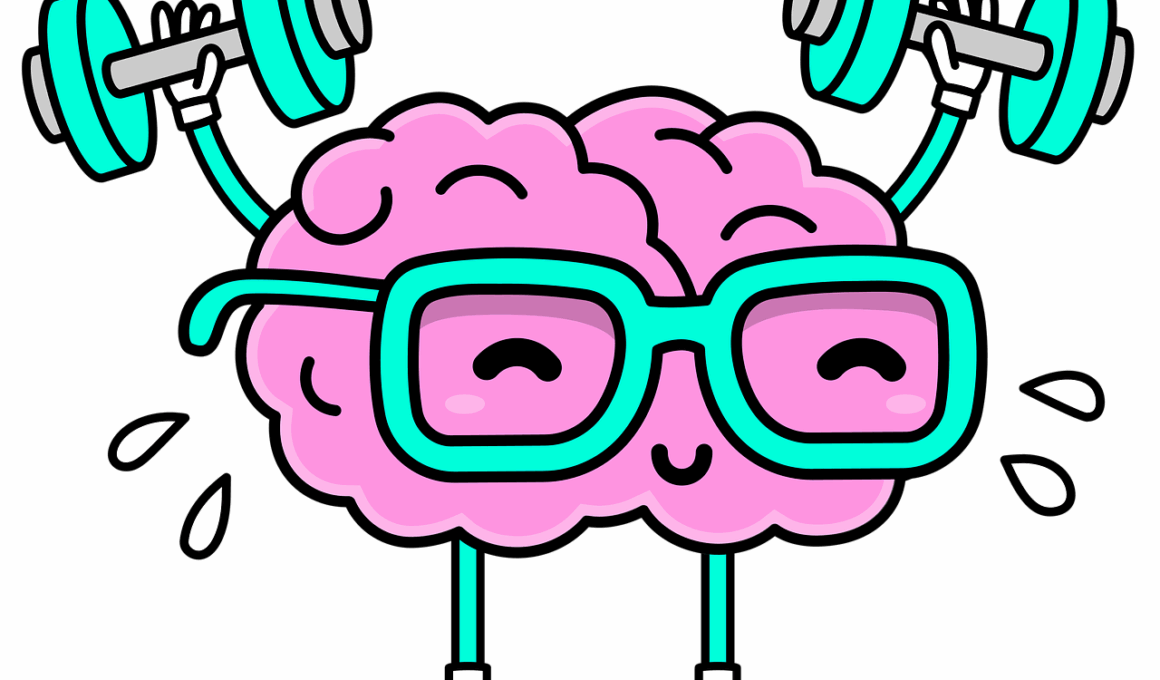The Effects of Exercise on Brain Health and Cognitive Function
Exercise has become increasingly recognized for its profound benefits, extending far beyond physical fitness. In particular, its influence on brain health and cognitive function has been a growing area of research. Numerous studies indicate that engaging in regular physical activity can significantly improve cognitive performance, promote neuroplasticity, and reduce the risk of age-related cognitive decline. Exercise appears to stimulate the release of various neurotrophic factors, which are essential for neuron growth and survival. This physiological response helps improve memory, learning, and overall mental clarity. Furthermore, exercise increases blood flow to the brain, ensuring that it receives adequate oxygen and nutrients. Consequently, this can lead to enhanced brain function. Additionally, regular physical activity is linked to improved mood and a reduced incidence of anxiety and depression. Such mental health benefits can further contribute to cognitive enhancement. Overall, incorporating exercise into one’s daily routine not only promotes physical well-being but also plays a pivotal role in enhancing cognitive health. This connection allows individuals to lead fuller, healthier lives, characterized by better brain function and emotional stability. The importance of this connection cannot be overstated in our ever-evolving society.
The Physiological Mechanisms of Exercise
Understanding how exercise facilitates cognitive enhancement requires examining the physiological mechanisms involved. One key process is the elevated production of brain-derived neurotrophic factor (BDNF). This protein is crucial for supporting neuron growth, development, and survival. During exercise, increased levels of BDNF have been noted, translating into improved learning and memory capabilities. Exercise also promotes neurogenesis, which refers to the formation of new neurons, particularly in the hippocampus—a brain region integral to memory and learning. Enhanced cardiac performance during physical activity leads to improved oxygenation of the brain, fostering an environment conducive to cognitive function. Additionally, regular physical activity helps modulate inflammation and oxidative stress, which can otherwise harm brain health and contribute to cognitive decline. Maintaining a balance of neurotransmitters, such as serotonin and dopamine, is essential for mood regulation and cognitive functionality, and exercise has been shown to positively influence their levels. These physiological responses underscore the multifaceted relationship between exercise and cognitive health. As individuals navigate through various life stages, understanding these mechanisms can significantly motivate them to engage in regular physical activity for optimal brain function and overall well-being.
Incorporating aerobic exercises into your routine can benefit cognitive function in various ways. Activities like running, swimming, or cycling have demonstrated substantial effects on improving memory and cognitive flexibility. Engaging in aerobic exercises has been proven to increase capillary density in the brain, further enhancing blood flow while also increasing mitochondrial efficiency. This leads to higher levels of energy production within brain cells, fostering a fertile ground for neurogenesis and promoting the production of BDNF. Additionally, aerobic activities inspire individuals to engage more socially, thus providing emotional and psychological benefits. This sociability can encourage cognitive engagement, reduce stress, and promote overall mental health. Moreover, studies show that moderate-intensity aerobic exercises may lead to a significant decrease in age-related cognitive decline. Older adults who participated in structured aerobic training sessions exhibited marked improvements in cognitive tests compared to sedentary peers. Importantly, establishing a consistent routine is key to maintaining these cognitive benefits. As individuals commit to regular exercise, they’re laying down not only the groundwork for better physical health but also creating substantial improvements in cognitive function. Thus, embracing aerobic exercise proves instrumental for anyone looking to enhance their cognitive performance.
On the other hand, resistance training has also been linked to improved cognitive health and function. While traditionally associated with building muscle and strength, these exercises provide substantial benefits for brain health as well. Research suggests that engaging in regular resistance training leads to improved executive function, including decision-making skills and organization. This may be attributed to the increased production of hormones and growth factors that play essential roles in cognitive function. Notably, this form of exercise has been shown to benefit older adults by mitigating cognitive decline associated with aging and neurodegenerative diseases. The challenges posed by resistance training encourage individuals to focus mentally, promoting increased cognitive engagement. Furthermore, some studies indicate that such training can enhance mood and alleviate symptoms of anxiety and depression—factors that can negatively influence cognitive function. Incorporating a combination of both aerobic and resistance training can provide a comprehensive approach to brain health. As individuals recognize the interconnectedness of physical and cognitive fitness, they can prioritize activities that foster overall well-being, improving both physical strength and mental agility.
Exercise and Mental Health
The relationship between exercise and mental health is crucial when exploring cognitive function. Regular physical activity has been documented to improve mood and decrease anxiety and depression symptoms. Exercise induces the release of various neurotransmitters, such as endorphins, which can lead to feelings of happiness and satisfaction. This noticeable boost in mood and cognitive clarity actually enhances one’s ability to process information and think critically. Additionally, exercise promotes mindfulness—a mental state that fosters a keen awareness of the present moment. Engaging in mindfulness practices through activities such as yoga can reduce stress and improve cognitive health. The social aspect of group exercises or team sports can further augment these benefits by providing emotional support and camaraderie. Such environments can reduce feelings of isolation and promote a sense of belonging, which are critical for mental well-being. In turn, these improvements in mental health can directly impact cognitive performance, creating a positive feedback loop. As the brain begins to function optimally, clarity, focus, and memory can significantly improve, proving that taking care of one’s mental health through exercise is vital for cognitive longevity and overall quality of life.
Age is a significant factor influencing the degree to which exercise impacts cognitive function. While individuals of all ages can benefit from regular physical activity, older adults may experience marked gains in cognitive health. Regular exercise counteracts age-related changes often associated with dementia and other neurodegenerative conditions. By stimulating brain health, older adults can maintain their cognitive functions longer and enjoy a better quality of life. Engaging in high-intensity interval training (HIIT) or memory-focused exercises could be particularly effective. Studies indicate that even moderate levels of physical activity, so long as they are consistent, can yield cognitive benefits. Moreover, it’s essential to note that starting to exercise at any age can bring substantial advantages for brain health. Some research suggests that it’s never too late to begin an exercise routine to improve cognitive function. Older adults need tailored exercise programs that consider their unique physical and cognitive needs, fostering inclusivity and encouraging participation. This is crucial as our global population ages, emphasizing the necessity of leading an active lifestyle to promote healthy aging and preserve cognitive health well into the later years of one’s life.
Conclusion
Maintaining brain health and cognitive function is of paramount importance across the lifespan, and exercise plays a remarkable role in this equation. Numerous studies validate the concept that regular physical activity—regardless of the type or intensity—has lasting benefits for mental acuity and emotional well-being. The physiological mechanisms activated by exercise promote neurogenesis, increase blood flow, and regulate neurotransmitters, creating optimal conditions for cognitive function. Both aerobic and resistance training are vital components of an effective exercise regimen, each offering unique benefits that can enhance mental performance. Recognizing the interplay between mental and physical health, individuals should be encouraged to engage in comprehensive exercise routines tailored to their preferences and needs. As society continues to evolve, it becomes critical to prioritize brain health, making exercise a cornerstone of well-being. Ultimately, the connection between physical fitness and cognitive vitality underlines the importance of leading an active lifestyle that will pave the way for better overall health. Promoting such practices allows individuals to thrive mentally, emotionally, and physically, contributing to a healthier, happier, and more fulfilling life as we advance through different life stages.
As the scientific community continues to unravel the complexities of the human brain, embracing exercise as a tool for cognitive enhancement is essential. Engaging in regular physical activity can foster a myriad of benefits that significantly contribute to cognitive health while mitigating age-related declines. This journey highlights not only physical fitness but also the importance of embracing a holistic approach to overall well-being. The growing body of evidence surrounding this topic indicates a compelling need for public health initiatives that promote exercise across all age groups. Schools, workplaces, and communities should work together to create environments conducive to physical activity. As the link between exercise and brain health becomes increasingly evident, it has become clear that prioritizing physical activity can empower individuals to take charge of their cognitive health. Future research will undoubtedly continue to expand on these findings, emphasizing the necessity of implementing exercise as a critical component of cognitive health strategies. Individuals are encouraged to start or maintain an exercise routine, committing to regular activities that best suit their lifestyles. The benefits of investing time and effort into such activities far outweigh the potential barriers, leading to enhanced cognitive performance and a healthier, more fulfilling lifestyle.


